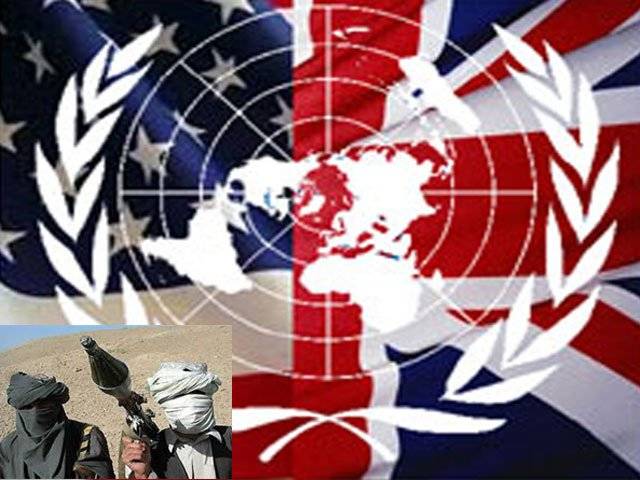Britain and the United States are pressing for United Nations sanctions against 18 former senior Taliban figures to be lifted later this month in the strongest indication yet that the western powers are looking for a negotiated peace with the Taliban. Officals believe the move would send a clear signal to insurgents that reintegrating into Afghan society is possible if they put down their arms. The sanctions were imposed in 1999, when the Taliban were in power, and were expanded after the 9/11 attacks on America. They ban about 140 individuals from travelling or holding bank accounts. Removing the restrictions has been a key demand of insurgents in Afghanistan and has long been supported by the Afghan government. Candidates include well-known figures who have acted as intermediaries in contacts between the Afghan government and the insurgents in recent years such as Arsala Rahmani, a former Taliban education minister, as well as Qalamuddin, who has kept a low profile since being released from prison in 2005. An Afghan minister also said that lifting the sanctions on such men would facilitate the establishment of a political office for the Taliban in a third country as it would allow key intermediaries, mainly former senior figures in the movement now living in Kabul, to travel. Turkey, Turkmenistan and Qatar have all offered to host such an office, Afghan and western officials in Kabul have told the Guardian. Senior Afghan officials in Kabul also said that contacts with the Taliban leadership could now be described as "systematic" and a "significant advance" on earlier "disorganised" discussions. The talks involve an envoy traveling between Kabul and Pakistan on a regular basis relaying proposals and counterproposals, said the minister, who has direct knowledge of the "peace process" as it is known in the Afghan capital. The meetings come at a time of intensifying effort to find a negotiated solution to the 10-year-old conflict in Afghanistan as western governments prepare to withdraw troops. It was recently disclosed that US officials and a Taliban representative have held three meetings in the last two months, two in Qatar and one in Germany. In another important development, representatives of the Haqqani network, one of the most effective and intractable of the insurgent factions, visited Kabul "very recently", the officials told the Guardian. The Haqqani network, named after its leader Jalaluddin Haqqani, is widely believed to have a relationship with the ISI, Pakistan's main military intelligence service. In the last six years only 15 names have been removed from the sanctions list. A key shift has been in Washington where there is now almost unanimous support for the delisting of dozens of individuals. Delisting requires the assent of the five permanent members of the UN security council. Russia has made clear that it currently opposes any such move and may block any mass lifting of sanctions. France supports the move while China appears ambivalent. A request for the delisting of 47 individuals was supposed to be submitted by Kabul to the UN sanctions committee before a key meeting on 16 June. However, the necessary documentation for only 18 individuals was assembled in time by Afghan officials. Further opportunities to remove individuals will come later in the year. Britain and America are also keen to scrap entirely or split the sanctions list to distinguish between al-Qaida and the Taliban. However, the proposed lifting of UN sanctions has not been met with universal approval in Afghanistan. "If there is a deal with the Taliban and people like him [Qalamuddin] come back to power it will all go back to being like before and we will lose all our freedoms," said Monisa, a 24-year-old female NGO worker in Kabul. Earlier this week Qalamuddin told the Guardian the restrictions weighed on him "as a human being" and that he has "rights like anyone else". Active Taliban are unlikely to be among those removed from the sanctions list, officials said. "Don't expect to see Mullah Omar [the Taliban overall leader] among them," one said.
Saturday, April 20, 2024
US, UK pushing UN for lifting sanctions against 18 senior Taliban leaders

PM Shehbaz strongly condemns attack on Customs officials in DI Khan
12:24 PM | April 20, 2024
ECP all set to conduct by-polls in 21 constituencies tomorrow
11:43 AM | April 20, 2024
US considers over $1bn weapons deal for Israel amid Middle East tensions
11:09 AM | April 20, 2024
Bilawal demands govt to hold ‘tripartite dialogue’ to curb terrorism
10:58 AM | April 20, 2024
Policitising Tragedy
April 20, 2024
Tehran to Rafah
April 20, 2024
A New Leaf
April 20, 2024
A Tense Neighbourhood
April 19, 2024
Dubai Underwater
April 19, 2024
Dangers of Deepfakes
April 20, 2024
Feudalism
April 20, 2024
Kite tragedy
April 19, 2024
Discipline dilemma
April 19, 2024
Urgent plea
April 19, 2024
ePaper - Nawaiwaqt
Advertisement
Nawaiwaqt Group | Copyright © 2024





